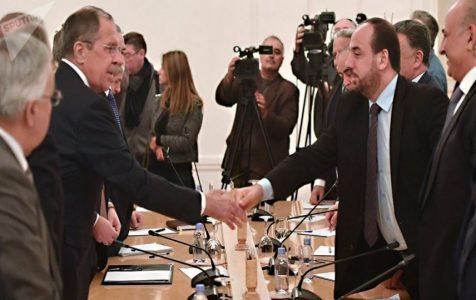
ISIS failed to create new caliphate but terrorist pockets are still active
On Monday at a meeting between Russian Foreign Minister Sergey Lavrov and head of the delegation of the Syrian Negotiation Commission (SNC) Nasser Hariri, the politicians spoke about a terrorist threat in Syria and prospects of the peace settlement in the country.
The ISIS terrorist group failed to reach the goal of creating the Caliphate on the Syrian territory, but some terrorist pockets are yet to be suppressed, Lavrov noted.
The minister attributed the significant success made in fighting against terrorism in Syria to the Astana format and to the agreements that were reached between Russia, the United States and Jordan on the establishment of the southern de-escalation zone.
However, Lavrov also expressed concern about the events in Syria’s Idlib and Eastern Ghouta as “attacks on Damascus, including the shelling of the territory of the Russian embassy, come from eastern Ghouta, which is a safe zone.”
“We expect that the promotion of the intra-Syrian dialogue and the beginning of a steadfast negotiating process on the future of Syria will unite the efforts of all Syrians to eradicate the terrorist threat in the country,” the minister added.
The main goal of the Syrian National Dialogue Congress in Sochi is to ensure the effective implementation of the Geneva process under the auspices of the United Nations, Lavrov said.
“We tried to form a list of invitees to the Sochi Congress in such a way that this goal — to collect under one roof all representatives of the Syrian society, both the government and the opposition — was achieved,” the Russian minister added.
Moscow expects that everyone who has influence on various opposition groups in Syria will help advance the political settlement in order to “ensure the truly inclusive nature of the intra-Syrian dialogue”, according to Lavrov
Moscow considers ‘counterproductive’ the attempts by certain external players to downplay Russia’s efforts in Syrian peace process and calls on all parties to Geneva talks to free the negotiating process from external interference, the Russian foreign minister said.
“I am sure that it is in the interest of the Syrian people to agree on the start of a process in Geneva on the basis of resolution 2254 that will be freed from nonconstructive external influence and that will allow the beginning of negotiations on the whole range of the Syrian settlement, starting with the constitution and the preparation for elections, which should be held without any preconditions,” Lavrov pointed out.
Russia is responsible to the international community for the implementation of previously reached main political settlement agreements on Syria, according to head of the SNC Hariri.
“Our approach is based on the need of political transition in Syria in line with Geneva communique and Resolution 2254. Russia was a very important side which contributed to signing of these documents, that’s why now it carries responsibility, legal liability to international community for the implementation of these documents,” he said after talks with Lavrov.
Syria has been engulfed in a civil war since 2011, with government forces fighting numerous opposition factions and terrorist groups. The UN Security Council Resolution 2254 adopted in December 2015 urges UNSC member states to support efforts to introduce a ceasefire and calls for talks between the Syrian government and opposition.
Russia, alongside Iran and Turkey, is a guarantor of the ceasefire regime in Syria. Moscow has also been assisting Damascus both through supporting the struggle against the terrorist groups and by providing humanitarian aid to the residents of the crisis-torn country.
Moscow is also trying to align the interests of all sides involved in settling the Syrian conflict, including external actors, by convening the Syrian National Dialogue Congress due to take place in the Russian resort city of Sochi from January 29 to January 30. According to Russian Special Envoy to Syria Alexander Lavrentyev, the forum, which is expected to launch the process of drafting the new Syrian constitution, will provide an opportunity for both the government and the domestic, external and armed opposition groups to express their positions.
Source: Sputnik





